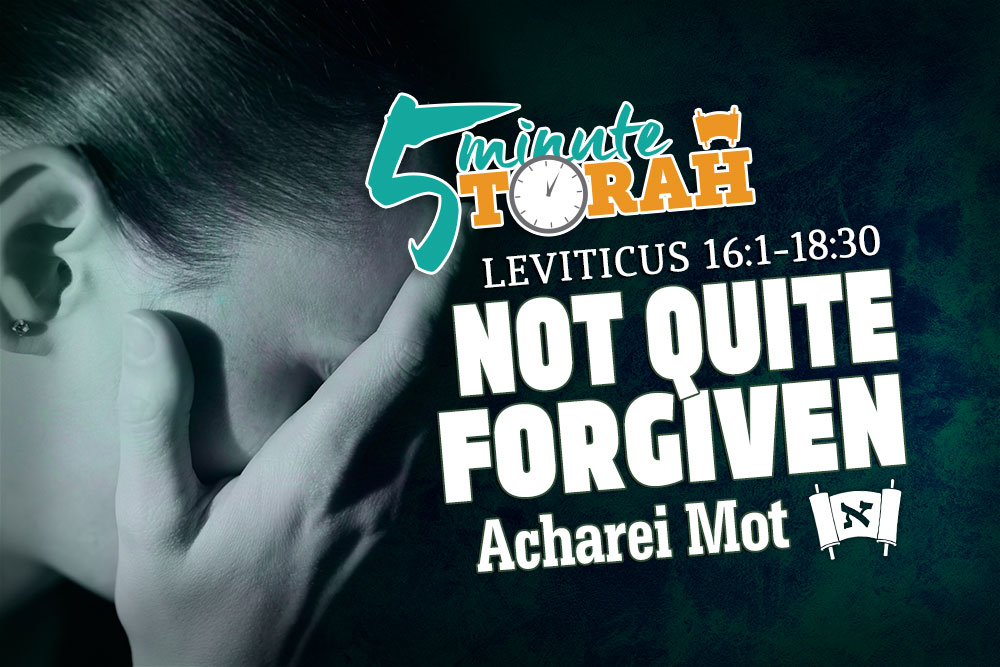Not Quite Forgiven
Series:

Parashat Acharei Mot (Leviticus 16:1-18:30)
Acharei Mot begins with instructions for Yom Kippur, the Day of Atonement. It is one of the most important days of the year, and from our reading we can see the how atonement and forgiveness are granted for the nation of Israel. Often, we often fail to notice the details of the Yom Kippur service and exactly what is going on. There are two specific things that we need to realize about this ritual. The first involves the function of the two goats, and the second involves exactly what could and couldn’t be forgiven. Let’s begin by understanding the purpose of each of these animals.
Of the two goats of the Yom Kippur service, the goat that was designated l’Adonai, “for the LORD,” was slaughtered for the sanctification of the Tabernacle/Temple and all its furnishings:
Then he shall kill the goat of the sin offering that is for the people and bring its blood inside the veil and do with its blood as he did with the blood of the bull, sprinkling it over the mercy seat and in front of the mercy seat. Thus he shall make atonement for the Holy Place, because of the uncleannesses of the people of Israel and because of their transgressions, all their sins. And so he shall do for the tent of meeting, which dwells with them in the midst of their uncleannesses. (Leviticus 16:15–16)
Although this goat was considered a chata’at, a sin offering, it only functioned to cleanse the Holy House from the impurities of the Children of Israel that had accumulated during the previous year. It did not actually remove sin from the people. However, the goat that was designated l’Azazel, “for Azazel,” quite literally took away the sins of the Children of Israel when it was sent into the wilderness:
And Aaron shall lay both his hands on the head of the live goat, and confess over it all the iniquities of the people of Israel, and all their transgressions, all their sins. And he shall put them on the head of the goat and send it away into the wilderness … The goat shall bear all their iniquities on itself to a remote area … For on this day shall atonement be made for you to cleanse you. You shall be clean before the LORD from all your sins. (Leviticus 16:21–22, 30)
Both of these animals served an importance purpose. Of the two goats of the Yom Kippur service, however, only the living one was able to bear the sin of the people and take away their sin. In this we can see an allusion to the work Yeshua would do on our behalf. Unfortunately, many people are under the false impression that the action of sending out the goat on Yom Kippur itself has the ability to take away sin. However, this is not how it works. In order for an individual to benefit from the Yom Kippur ritual, genuine repentance had to take place. God isn’t interested in a lifeless ritual. He desires the heart. This is why the sacrifices of Yom Kippur cannot cleanse everyone, nor forgive all sins:
With regard to one who says: I will sin and Yom Kippur will atone for my sins, Yom Kippur does not atone for his sins. Furthermore, for transgressions between a person and God, Yom Kippur atones; however, for transgressions between a person and another, Yom Kippur does not atone until he appeases the other person. (b.Yoma 85b)
The author of Hebrews agrees, saying, “For if we go on sinning deliberately … there no longer remains a sacrifice for sins” (Hebrews 10:26). Yeshua also taught his disciples these same principles:
For if you forgive others their trespasses, your heavenly Father will also forgive you, but if you do not forgive others their trespasses, neither will your Father forgive your trespasses. (Matthew 6:14–15)
This is why repentance was at the core of Yeshua’s good news of the Kingdom. It was his gospel message. To our modern ears his message would sound something like, “Repent and do what is right so that I may establish my Messianic Kingdom in your lifetime!” Just as atonement through the goats of Yom Kippur was limited by individual choices, so too is atonement through Yeshua limited by our choices. There is hope, however. Hebrews tells us:
For if the blood of goats and bulls, and the sprinkling of defiled persons with the ashes of a heifer, sanctify for the purification of the flesh, how much more will the blood of Christ, who through the eternal Spirit offered himself without blemish to God, purify our conscience from dead works to serve the living God. (Hebrews 9:13–14)
The author of Hebrews validates the ability of the sacrificial system to cleanse a person of ritual impurity, and then tells us, “how much more” the work of Messiah will be effectual on our behalf. We have a great hope in a Redeemer who is able to bear our burdens and remove our sin. But we can only benefit from his work if we heed his gospel message. And until we truly repent, we are not quite forgiven. May our hearts discern the incredible work that he has done on our behalf and motivate us to true repentance so that we may be able to be completely cleansed by his blood and transformed into his nature.








